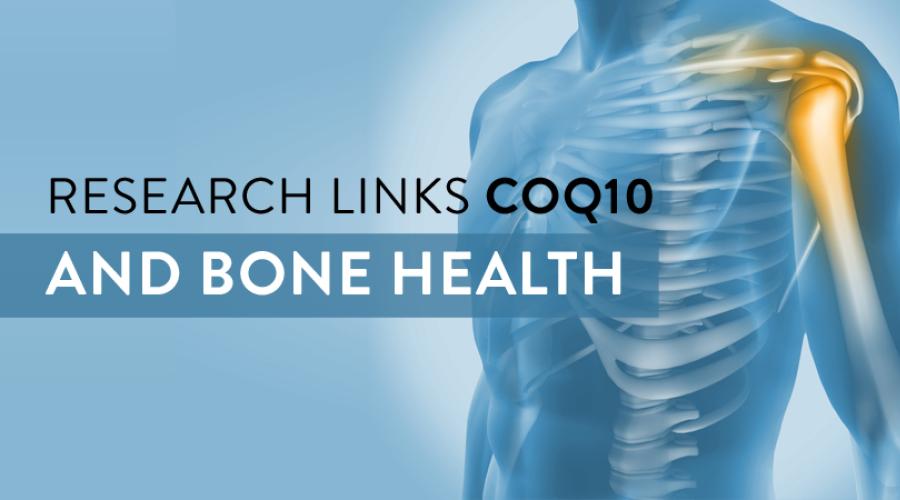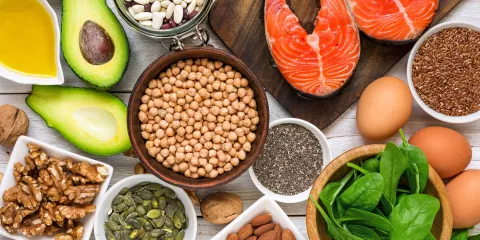
The Link Between CoQ10 and Bone Health
Maintaining bone health is a lifelong process, and becomes even more important as we age. Bone health is associated with many factors, including age, genetics and family history, and lifestyle factors, such as calcium and Vitamin D intake, physical activity level and tobacco and alcohol use.
A balanced diet of fruit, vegetables, whole grains, proteins and low-fat dairy products is imperative to keep the proper internal environment for bone health as well as to provide key micronutrients used in bone formation, such as calcium, vitamin D, phosphorus, magnesium, copper, zinc. Regular physical exercise from childhood through adulthood is also critical in producing high bone mass in the growth years and then maintaining it in the older years. Smoking and excessive alcohol consumption have direct negative effects on bone health.1 Also, emerging evidence suggests that bone biology is affected by free radicals, which can have a detrimental effect on bone health, particularly when there is imbalance between production of free radicals and the body’s own antioxidant defense system.
Among the important energy and antioxidant functions of CoQ10, two research studies have revealed a very interesting action of CoQ10 – one that may support bone health. The health and strength of bones involves many factors, but chief among them is a process called resorption, a balance between bone formation (performed by osteoblast cells) and bone dissolution or degradation (performed by osteoclast cells). In healthy people, many factors combine to ensure that bone formation exceeds bone dissolution so that strong, healthy bones are maintained.
Recently, a study was conducted that showed that the antioxidant Ubiquinol coupled with rigorous exercise could help maintain the function of osteoblast, the cells that build bone, keeping the bone building-bone resorption equation in balance. In a randomized, double-blind and placebo-controlled trial, 100 healthy firemen received 200 mg of Ubiquinol or placebo for two weeks, followed by two sessions of high intensity exercise 24 hours apart. Osteocalcin, a protein hormone secreted by osteoblasts that binds calcium in the bones, significantly increased in the Ubiquinol group compared to placebo both following the two weeks of supplementation before exercise and after the two sessions of exercise (p<0.05).2
Pre-clinical, in vitro studies have helped illuminate the mechanism by which CoQ10 may contribute to this phenomenon. In one study, CoQ10 was incubated with osteoclasts that had been stimulated to start resorbing bone. The CoQ10 neutralized the free radicals within the osteoclasts, and both suppressed the signaling pathways that turn on resorption and the expression of genes associated with osteoclasts revving up to do their job. The formation of activated osteoclast cells was also markedly inhibited.3
These results encouraged the same group of researchers to look deeper. In a second in vitro study, investigators confirmed the effects of CoQ10 on inhibition of free radicals, the signaling pathways and genes that turn on osteoclasts and the formation of activated cells.4 They also showed that CoQ10 activated osteoblasts, and elevated biomarkers and genetic transcription factors. These factors are indicative of bone formation. These positive effects, observed in cell lines, increased with increasing CoQ10 levels.
While these findings are exciting, the research does not mean that this will happen in humans. Additional research in humans is necessary to confirm the role of Ubiquinol, the antioxidant form of CoQ10, in supporting bone health.
Articles You Might Also Like
References
1 Wilson-Barnes SL, Lanham-New SA, Lambert H. Modifiable risk factors for bone health & fragility fractures. Best Pract Res Clin Rheumatol. 2022 Sep;36(3):101758.
2 Díaz-Castro J, Mira-Rufino PJ, Moreno-Fernández J, Chirosa I, Chirosa JL, Guisado R, Ochoa JJ. Ubiquinol supplementation modulates energy metabolism and bone turnover during high intensity exercise. Food Funct. 2020:11:7523-7531
3 Moon HJ, Ko WK, Han SW, Kim DS, Hwang YS, Park HK, Kwon IK. Antioxidants, like coenzyme Q10, selenite, and curcumin, inhibited osteoclast differentiation by suppressing reactive oxygen species generation. Biochem Biophys Res Commun. 2012 Feb 10;418(2):247-53.
4 Moon HJ, Ko WK, Jung MS, Kim JH, Lee WJ, Park KS, Heo JK, Bang JB, Kwon IK. Coenzyme Q10 regulates osteoclast and osteoblast differentiation. J Food Sci. 2013 May;78(5):H785-891.












